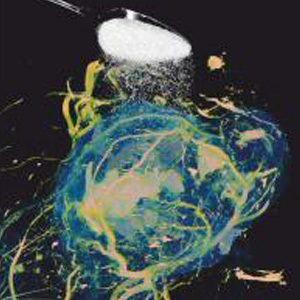
Credit: UCL
A new technique for detecting cancer by imaging the consumption of sugar with magnetic resonance imaging (MRI) has been unveiled by UCL scientists. The breakthrough could provide a safer and simpler alternative to standard radioactive techniques and enable radiologists to image tumours in greater detail.
The new technique, called 'glucose chemical exchange saturation transfer' (glucoCEST), is based on the fact that tumours consume much more glucose (a type of sugar) than normal, healthy tissues in order to sustain their growth.
The researchers found that sensitising an MRI scanner to glucose uptake caused tumours to appear as bright images on MRI scans of mice.
Cheap, safe alternative
Lead researcher Dr Simon Walker-Samuel, from the UCL Centre for Advanced Biomedical Imaging (CABI) said: "GlucoCEST uses radio waves to magnetically label glucose in the body. This can then be detected in tumours using conventional MRI techniques. The method uses an injection of normal sugar and could offer a cheap, safe alternative to existing methods for detecting tumours, which require the injection of radioactive material."
Professor Mark Lythgoe, Director of CABI and a senior author on the study, said: "We can detect cancer using the same sugar content found in half a standard sized chocolate bar. Our research reveals a useful and cost-effective method for imaging cancers using MRI – a standard imaging technology available in many large hospitals."
He continued: "In the future, patients could potentially be scanned in local hospitals, rather than being referred to specialist medical centres." The study is published in the journal Nature Medicine and trials are now underway to detect glucose in human cancers.
Vulnerable groups can be scanned regularly
According to UCL's Professor Xavier Golay, another senior author on the study: "Our cross-disciplinary research could allow vulnerable patient groups such as pregnant women and young children to be scanned more regularly, without the risks associated with a dose of radiation."
Dr Walker-Samuel added: "We have developed a new state-of-the-art imaging technique to visualise and map the location of tumours that will hopefully enable us to assess the efficacy of novel cancer therapies."
The new technique, called 'glucose chemical exchange saturation transfer' (glucoCEST), is based on the fact that tumours consume much more glucose (a type of sugar) than normal, healthy tissues in order to sustain their growth.
The researchers found that sensitising an MRI scanner to glucose uptake caused tumours to appear as bright images on MRI scans of mice.
Cheap, safe alternative
Lead researcher Dr Simon Walker-Samuel, from the UCL Centre for Advanced Biomedical Imaging (CABI) said: "GlucoCEST uses radio waves to magnetically label glucose in the body. This can then be detected in tumours using conventional MRI techniques. The method uses an injection of normal sugar and could offer a cheap, safe alternative to existing methods for detecting tumours, which require the injection of radioactive material."
Professor Mark Lythgoe, Director of CABI and a senior author on the study, said: "We can detect cancer using the same sugar content found in half a standard sized chocolate bar. Our research reveals a useful and cost-effective method for imaging cancers using MRI – a standard imaging technology available in many large hospitals."
He continued: "In the future, patients could potentially be scanned in local hospitals, rather than being referred to specialist medical centres." The study is published in the journal Nature Medicine and trials are now underway to detect glucose in human cancers.
Vulnerable groups can be scanned regularly
According to UCL's Professor Xavier Golay, another senior author on the study: "Our cross-disciplinary research could allow vulnerable patient groups such as pregnant women and young children to be scanned more regularly, without the risks associated with a dose of radiation."
Dr Walker-Samuel added: "We have developed a new state-of-the-art imaging technique to visualise and map the location of tumours that will hopefully enable us to assess the efficacy of novel cancer therapies."




 Publications
Publications
 Partners
Partners














